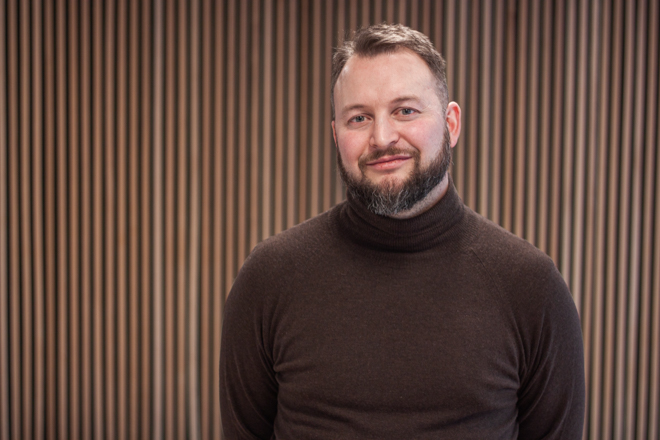At the Institute for Social Research, we are expanding our research on migration, and our first hire is sociologist Erlend Paasche. Erlend has 10 years of experience researching migration and an academic background in Middle Eastern studies. He has spent several years in the Middle East and done field work in Syria, Iraq, Kosovo, and Nigeria.
“International experience can prove useful in understanding the international phenomena of migration, migrants, and their transnational lives,” Erlend says. “My goal is to combine studies on what drives international migration with studies on how Norway and other European countries can best balance different and often conflicting political interests.”
An Era of Transition for Migration
Erlend thinks global migration is in a transitional period in which both migrants and governments are using new technologies, and we have yet to see the full effects of this development.
“On one hand, the notion of peaceful, industrialized states quickly spreads on social media, as does the practical information about how to get to them,” Erlend continues. “This expands migrants’ social and transnational networks. On the other hand, we see governments employing new technologies, like biometric identification and drones, in order to stop irregular migrants. Moreover, we only have the vaguest idea of how big data and artificial intelligence will affect border control.”
He also emphasizes another trend defining the transitional nature of this era: more and more institutions tasked with tackling global migration are under pressure. The Convention Relating to the Status of Refugees is being challenged, and the UN High Commissioner for Refugees is struggling to secure funding. We are also seeing the reemergence of nationalist tendencies within the European Union (EU), where the idea of open borders within the Schengen Area has lost popularity.
More Selective Immigration Control
According to Erlend, international migration control has become more selective, not more restrictive. “Host states want profitable migrants, are under pressure from right-wing populist parties, and want to avoid international commitments leading to less profitable migration.”
The EU has sought to reinforce the borders of its member states by signing deals with countries such as Turkey and Libya in order to reduce the number of asylum seekers and irregular migrants arriving in Europe. Turkey’s reopening of its border with Greece demonstrates how this makes Europe dependent on the goodwill of authoritarian regimes.
“Moving these borders solves some problems in the short term,” Erlend says, “but it also creates new legal and moral dilemmas.”
Volunteering in a Refugee Camp
Erlend became interested in migration while doing volunteer work in a Palestinian refugee camp in Lebanon at the turn of the millennium. This experience led him to pursue a master’s degree in in Middle Eastern studies—which included Arabic classes in Syria and Egypt. He wrote his thesis about the Iraqi refugee crisis of 2006–07, when millions of Iraqis fled the country’s escalating violence in what was the biggest refugee crisis in the region since the Palestinian exodus of 1948.
“I interviewed Iraqi refugees in Damascus and considered the potential of the conflict spreading from Iraq to Syria,” he says. “Civil wars tend to spread to neighboring states.”
The topic of his PhD thesis was the return of Iraqi Kurds from Europe. He investigated both the complex decision-making processes of those living in Europe who were considering a return to their homes and the reintegration of those who did return.
“An important finding regarding those trying to reestablish themselves in the partially autonomous region of Kurdistan was the impact of endemic corruption,” Erlend says. “Leaders and bureaucrats dictated the criteria for successful reintegration. Although some migrants benefitted from their social networks and friendships, the level of corruption had an alienating effect on most Iraqis. They returned from relatively transparent and functional states like Norway, and many looked forward to contributing to a nationalistic state-building project.”
Broad Experience
After acquiring his master’s degree, Erlend was involved in several assignments as a consultant for the Norwegian Directorate of Immigration, evaluating various programs assisting in the return of irregular migrants and rejected asylum seekers. In addition, on behalf of the European Commission, he completed an evaluation of the legal transposition and practical implementation of an EU directive on migration control at Norwegian airports.
Since 2016, he has been a postdoctoral fellow at the Department of Criminology and Sociology of Law at the University of Oslo at the University of Oslo, where he developed and taught a course on migration control and has conducted research on how Nigerian university students in Benin City perceive the risks associated with irregular migration and human trafficking.
His combination of research experience and experience working as a consultant will come in handy at the ISR.
“As a migration researcher, it is important to understand how migrants make their decisions and what kind of dilemmas they face,” Erlend says. “However, it is also important to understand the different rationales of host state migration policies and how such policies are translated into actual outcomes by bureaucrats, police officers, and other officials.”


